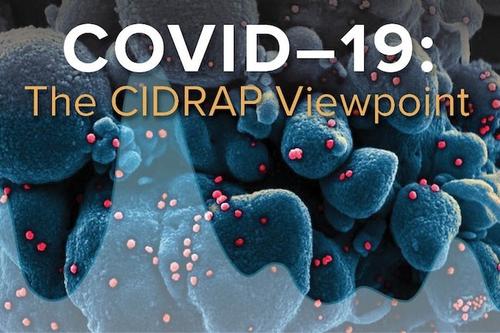In latest report, CIDRAP at the University of Minnesota provides tips for effective COVID-19 messaging

Credible, honest crisis communication is essential to keeping people safe and well-informed during the COVID-19 pandemic.
"Effective COVID-19 crisis communication," the second report in a multipart series titled, "COVID-19: The CIDRAP Viewpoint," was published today by the Center for Infectious Disease Research and Policy (CIDRAP) at the University of Minnesota. In the report, preeminent crisis communication expert Peter M. Sandman, Ph.D, and Jody Lanard, M.D., former adviser to the World Health Organization (WHO) on outbreak communication, provide government and public health leaders, communications professionals, and others responsible for COVID-19 messaging with six key principles of delivering messages to the public.
The report highlights real-world examples of effective and poor COVID-19 messaging and includes recommendations based on the six principles.
In addition, Sandman and Lanard provide four options for transitioning out of lockdown that reflect a gradient of potential risks to society and healthcare workers. And they underscore that a scenario of coming out of lockdown and rebuilding the economy without a sizable increase in serious COVID-19 illnesses and deaths is simply a pipedream.
Six principles of crisis communications:
- Don’t over-reassure.
- Proclaim uncertainty.
- Validate emotions—your audience’s and your own.
- Give people things to do.
- Admit and apologize for errors.
- Share dilemmas.
“Over-reassurance is the most common mistake officials make when crisis strikes — and they certainly made that mistake about COVID-19,” said Sandman. “The problem with over-reassuring frightened people is that they don’t believe you. They become more frightened and lose trust in the officials. The problem with over-reassuring complacent people and people in denial is that they do believe you. They grab onto the false reassurance and determine not to take precautions.
“Like most crises, the COVID-19 pandemic requires three kinds of risk communication. Before the crisis, the task is ‘precaution advocacy’ — warning a complacent public. We pretty much failed at that one. During the crisis, the task is ‘crisis communication’ — guiding a frightened public.
“As this report documents, we’re not doing such a great job of that. After the crisis or between waves of the crisis, the task is ‘outrage management’ — addressing recriminations about what went wrong. That’s the one that’s on deck right now, as officials face outraged criticism from all sides, much of it justified.”
"When faced with the biggest crisis of their lives, the COVID-19 pandemic, officials keep trying to reinvent the wheel — and too often they come up with a hexagon that doesn't roll," said Lanard.
"It's not enough to know what needs to be said; you need to know how to say it,” said Michael Osterholm, Ph.D., M.P.H., CIDRAP director and University of Minnesota Regents Professor, McKnight Presidential Endowed Chair in Public Health. “What Drs. Sandman and Lanard give us is a roadmap on how to take uncomfortable facts and share them with straight talk and honesty. This new report is another key contribution in our reality-based Viewpoint series on how to address this pandemic with facts and clarity."
Future reports in the "COVID-19: The CIDRAP Viewpoint" series will address testing, surveillance, contact tracing, supply chains, epidemiology issues and other key topics.
COVID-19 is a respiratory illness that was first identified in Wuhan, China, in December 2019. Confirmed US cases recently topped 1 million, and the global total has now topped 3.6 million confirmed infections, including more than 250,000 deaths.
The Viewpoint reports are made possible with support from the University of Minnesota Office of the Vice President for Research and the Bentson Foundation.
About the Center for Infectious Disease Research and Policy
The Center for Infectious Disease Research and Policy is a global leader in addressing public health preparedness and emerging infectious disease response. Founded in 2001, CIDRAP is part of the Office of the Vice President for Research at the University of Minnesota.
###




